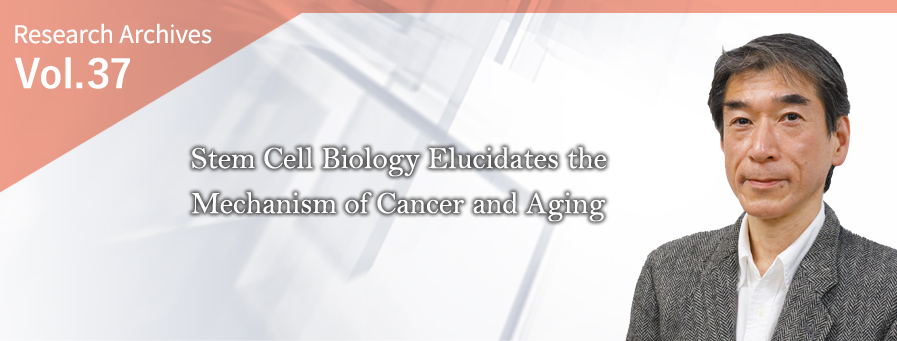
Department of Stem Cell Biology, Graduate School of Medicine, Hokkaido University
Toru Kondo Ph.D. Pathological
Oncology
- [Education]
-
- 1994 : Osaka University, Ph.D. in Molecular Biology(Supervisor: Prof. Yoshio Okada)
- [Positions held]
-
- 1994-1998 : Research Fellow, Osaka Bioscience Institute (Supervisor: Prof. Shigekazu Nagata)
- 1998-2001 : Research Fellow, MRC Laboratory for Molecular Cell Biology, University College London, UK
(Supervisor: Prof. Martin C. Raff) (1998-2000, JSPS research fellow for research abroad) - 2001-2002 : Associate Professor, Department of Cell fate modulation (Prof. Tetsuya Taga), Institute of Molecular
Embryology and Genetics, Kumamoto University - 2002–2005 : Group Leader (P.I.), Centre for Brain Repair, University of Cambridge, UK
- 2005-2010 : Team Leader (P.I.), RIKEN Center for Developmental Biology
- 2009-2012 : Professor, Department of Stem Cell Biology, Ehime University Proteo-Medicine Research Center
- 2012-present : Professor, Division of Stem Cell Biology, Institute for Genetic Medicine, Hokkaido University
Identification of membrane proteins and humoral factors associated with cancer and aging
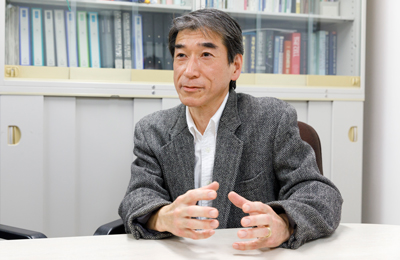
Professor Kondo, who took office in this department in 2012, is studying the mechanism of changes in tissue stem cells and their relationship with diseases and aging. Stem cells have the ability to self-renew and differentiate into various cells and are responsible for development and tissue regeneration.
“As you get older, you have poor memory, gray hair and wrinkles, which are thought to be due to dysfunction and abnormalities in the tissue stem cells that help maintain the body’s functioning. Meanwhile, it has become clear that cancer also has cells (cancer stem cells) that have similar functions to stem cells. Stem cells are closely related to the mechanism of cancer and aging,” Professor Kondo says.
Professor Kondo became interested in this field when he discovered the reversion of oligodendrocyte precursor cells (OPCs) into neural stem-like cells while studying at the University College London (UCL). OPCs are one of the cells that make up the central nervous system of higher organisms. After receiving various suggestions from his advisor and colleagues at UCL, he became independent as a group leader at the Cambridge Centre for Brain Repair, where he started full-scale research on the relationship between cancer or aging and stem cells.
After that, he became the team leader of the RIKEN Center for Developmental Biology and worked on model creation of cancer stem cell research and cell aging research.
“In general cancer research, human cancer cells are transplanted into immunodeficient mice to recreate the disease. However, the whole picture of how normal cells develop cancer, and the combination of the cells that are the origin of the cancer and gene mutations have not yet been clarified. In my research, I have been searching for important factors related to canceration by adding various gene mutations to the presumed origin cells of cancer and comparing cells that make cancer and cells that don’t, or comparing mouse and human cancer stem cells,” the professor says.
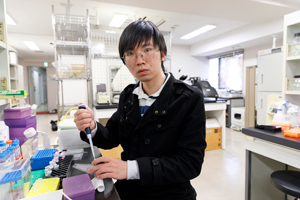
Professor Kondo’s research group is studying how changes in stem cells and precursor cells determine canceration and aging and lead to the onset of diseases. Among these studies, Professor Kondo is paying attention to membrane proteins, which are one of the genes specific to glioblastoma (the most malignant brain tumor) stem cells, and to humoral factors involved in the aging of neural precursor cells.
The Department of Stem Cell Biology is now conducting research focusing on the following three themes: (1) Analysis of brain tumor stem cells and development of new therapeutic methods, (2) Analysis of new genes related to Alzheimer’s disease and development of therapeutic methods, (3) Analysis of new genes related to aging. In each case, they are analyzing how membrane proteins and humoral factors are involved, which has led to developments such as obtaining patents and joint research with domestic and overseas venture companies.
“Why are you getting old? I think that research to find the answer with the goal of scientifically clarifying what everyone is wondering about is a self-expression as a researcher, and it is a real thrill. It would be even more fun if the results lead to opening up unknown areas,” the professor says.
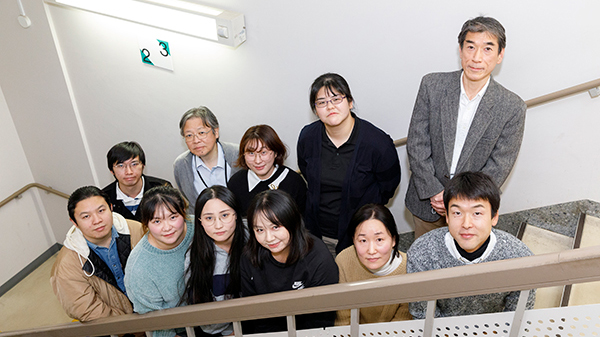
Promotion of cutting-edge research targeting brain tumors, dementia and obesity
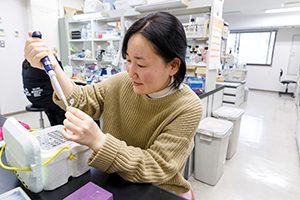
“To activate brown fat, it is good to take actions that generate heat in the body such as exercise, and it is said that the most effective is cold stimulation. However, using cold stimulation as a treatment for obesity is not very realistic. In our research, we are finding genes that are expressed only in brown fat and are looking for ways to enhance or diminish their function,” Lecturer Youlee Son says.
In the experiments by Lecturer Youlee Son, et al., when a gene specifically expressed in brown fat was selected as a candidate and a high-fat diet was given to normal mice and mice in which the gene was completely disabled, the mice in which the gene was disabled did not gain weight. Currently, they are working on elucidating the molecular mechanism of genes.
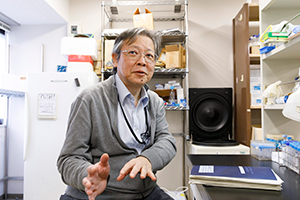
Cancer stem cells have the property of self-renewing and differentiating into various cancer cells. Assistant Professor Hashimoto’s research group collected the cells of malignant tumors in the brains of mice and compared the differences in gene expression between those with and without cancer stem cellularity. They are conducting research to identify gene expression peculiar to cancer stem cells and to develop diagnostic and therapeutic methods targeting the proteins and metabolites that cause the gene expression.
“This laboratory has the advantage of having advanced know-how on stem cell characterization based on Professor Kondo’s achievements, which is highly likely to lead to the development of drug discovery and therapeutic methods,” Assistant Professor Hashimoto says.
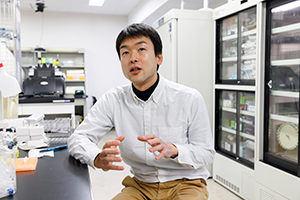
(Interviewed in November 2021)
Support for research activities through active communication
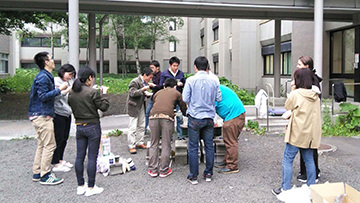
Due to the COVID-19 pandemic, they have been refraining from events. Previously, however, they held various events such as barbecue parties, dinner parties with guest speakers, and eating cakes handmade by graduate students. To promote research efficiently, group meetings are held separately from lab meetings, and members actively communicate with each other to improve research guidance and experimental techniques.


